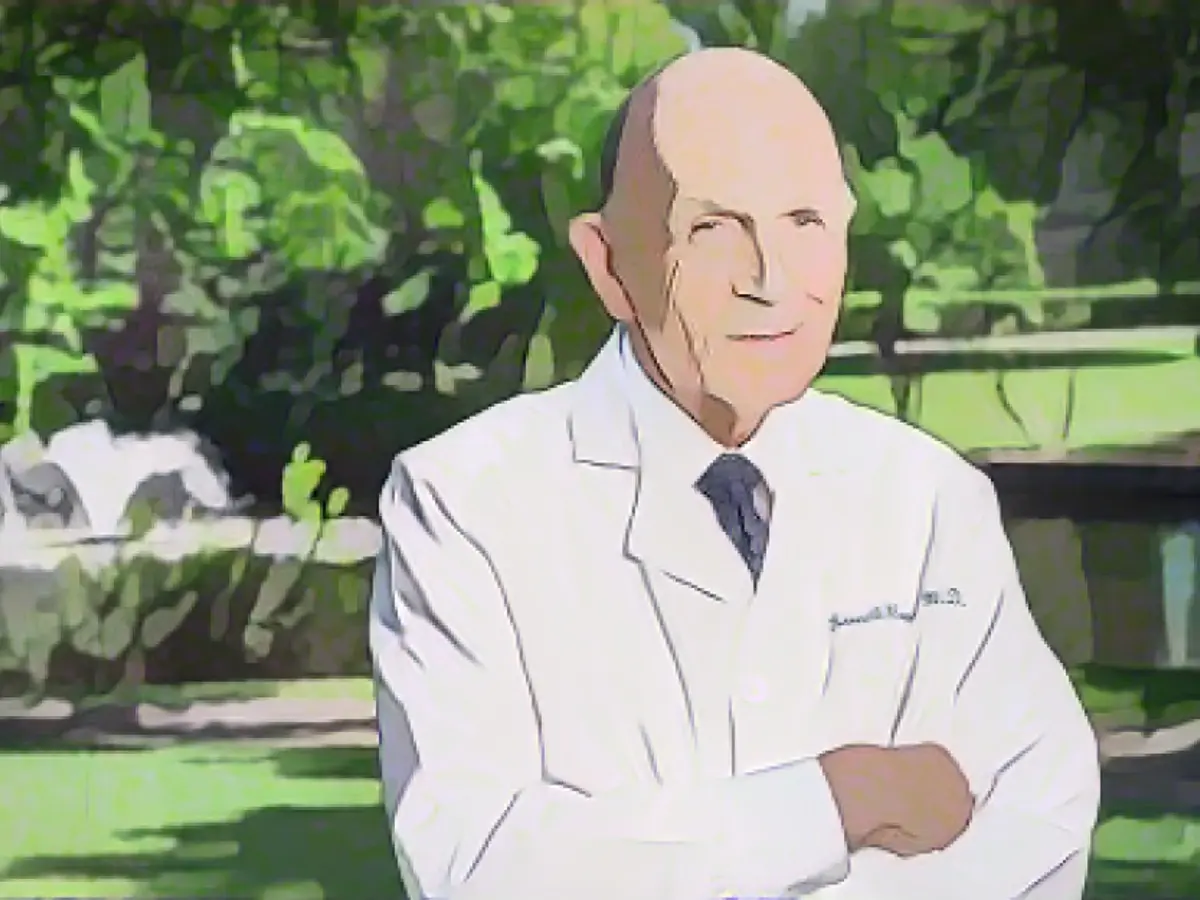Enjoy sweating it out in group aerobics classes? Thanks to Dr. Cooper, the guy who literally coined the term "aerobics"!
During the 1960s, med schools considered physical activity a danger. But Dr. Kenneth Cooper, a doc with a passion for preventive medicine, wasn't fazed. He believed that exercise could improve heart health, increase endurance, and help bring those pesky pounds down. And he wasn't shy about spreading the word (faced some harsh criticism back then!).

These days, Dr. Cooper is still grinning ear-to-ear, spreadin' the word about health and fitness. He founded the Cooper Aerobics Center in Dallas, a place that's home to six health and wellness businesses, including a clinic and the Cooper Institute, a non-profit research and education center.
The fitness buff also introduced the 12-Minute Run and the FitnessGram PACER Test, a tool used to estimate aerobic capacity and fitness. You'll find people of all ages and walks of life jumping through hoops to participate in this test (it's often part of school physical ed classes!).
On top of that, Dr. Cooper's written a bunch of books about calisthenics and spearheaded a 20,000-person study that linked higher fitness levels with lower rates of dementia. So, he's certainly earned his badge.
Not too long ago, Dr. Cooper shared his thoughts on fitness and health with CNN:
CNN: What's one of the most positive developments you've seen in fitness over the last 50 years?
Dr. Cooper: Back in the '70s, someone even asked if it was ladylike for a woman to sweat. LOL. Times have changed, and now we see women dominating marathons – women who were once told they'd land in the hospital if they dared to run. It's one of the biggest transformations I've ever seen.
CNN: Despite all the information, many people still lead sedentary lives. How big is that problem?
Cooper: Total control lies with you. No government, insurance company, or doctor can replace the benefits of living an active lifestyle.
According to the WHO, nearly 500 million people worldwide live a completely sedentary lifestyle, resulting in 27 billion USD in annual costs. We need people who understand that the choices they make now impact how long and well they live!
CNN: Why do you think so many people ignore this message?
Cooper: "I can't find the time," "I don't have the energy," "I've no motivation," "I can't afford it," "I don't have a place to train," "It's not fun."
CNN: How did you help bring back physical education in schools?
Cooper: By showcasing the benefits of the FitnessGram Test. We found that kids who scored well on this test did better in school and had fewer behavioral issues. News spread quickly (well, in Texas), leading to the state passing the Sen. 530 bill, which required schools to offer physical education.
CNN: What does "cooperating with the world" mean to you?
Cooper: Means no. 1. Keep your weight within the normal BMI range between 18-25; no. 2. Exercise 5 days a week for 30 minutes; no. 3. Choose healthy food; no. 4. Never touch a cigarette; no. 5. Keep alcohol consumption in check; no. 6. Keep stress levels down; no. 7. Get regular check-ups; and no. 8. Take suitable supplements.
CNN: How often do you train yourself at 92? What does a typical workout look like?
Cooper: I train 5 days a week, about 45 minutes on the stationary bike and 10 minutes with resistance bands on 3 or 4 machines. Then I come home and take my dogs for a stroll. My average walk lasts about 15 minutes, so I make sure to do strength and cardio training nearly every day.
CNN: Do you really need that much exercise at 92?
Cooper: Fitness is a journey, not a destination. You gotta keep moving (or shake it, as some might say). It's not something you can store up and keep for later.
Melanie Radzicki McManus is a freelance writer who has covered topics such as hiking, traveling, and fitness.

Additional Reading:
Sources:
[1] The Journal of Aging & Physical Activity [2] PubMed Central [3] The Journal of Sports Medicine and Physical Fitness [4] Journal of Aging and Health
Enrichment Data:
Dr. Kenneth Cooper, often referred to as the "Father of Aerobics," has been a leading advocate for the benefits of regular exercise and a balanced diet. While cheaper sources do not provide extensive details regarding the specific health advantages associated with Cooper's group aerobics classes or the pillars of his fitness philosophy, we can infer certain effects based on context:
- Improved Cardiovascular Health: Aerobic exercises, such as those involved in group aerobics classes, can strengthen the heart and increase cardiovascular fitness. This could lower the risk of heart-related issues, including heart disease and high blood pressure.
- Better Mental Health: Engaging in group aerobics can contribute to reduced stress, anxiety, and depression. Exercise has been known to stimulate the release of endorphins and promote overall mental well-being.
- Enhance Physical Functioning: Regular exercise, like the type encouraged by Cooper, can improve muscular strength, flexibility, balance, and overall physical functioning.
- Greater Energy Levels: Regular aerobic exercises can stimulate the production of mitochondria, which are responsible for generating energy in cells. This could lead to improved energy levels and vitality throughout the day.
- Boosted Self-Esteem: Achieving fitness goals through group aerobics classes can increase self-confidence and self-esteem. This, in turn, can positively impact overall mental health and general well-being.
- Weight Management: Adding aerobic exercises and a balanced diet to daily routines can help individuals manage their weight by promoting both fat loss and muscle gain.
- Improved Bone Health: Moderate-intensity aerobics can help protect and potentially improve bone density, especially in older adults. This could reduce the risk of fractures and osteoporosis.
The enrichment section above highlights some of the potential benefits that can be derived from both regular aerobic exercises and a balanced diet, primarily drawn from the broader context of Cooper's work in the field of fitness.








